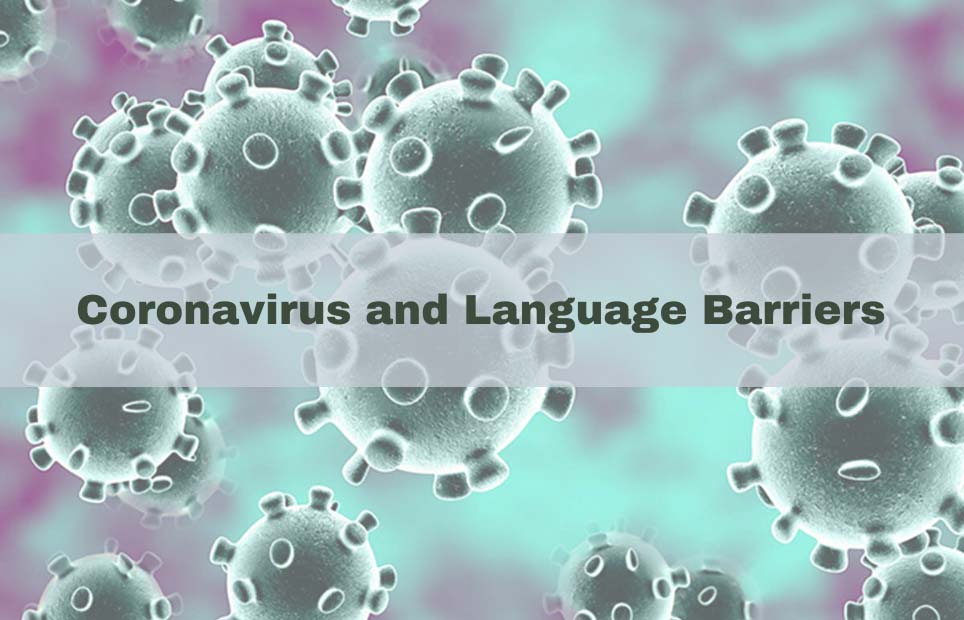[vc_row][vc_column][vc_column_text c_id=”.vc_1587006980002″]
The global village in which we live has innumerable benefits, making the world smaller and more connected than ever. However, periods of crisis like the recent coronavirus outbreak highlight our vulnerabilities in this system and draw attention to linguistic misunderstandings that can lead to devastating results.
The recent outbreak has shown how the paths we have built between nations and people can be used to rapidly spread infection in a way once unimaginable. It has also shown just how many real-life issues language barriers can cause in times of crisis, which this article addresses.
The international nature of the modern world means we have more problems of an international nature, and epidemics like coronavirus, SARS and Ebola are good examples of just how quickly viruses can manipulate the connections we have built. An international health crisis requires an international response, but this is made all the more difficult by complex linguistic realities around the world. For example, it’s all well and good to issue an official warning and advice in a country in its principal language, but if not everyone understands the language, it exposes everyone to possible dangers due to lack of information, lack of awareness or pure misinformation through social media. This can exacerbate a health crisis, lead to unnecessary stress and make tensions between linguistic minorities and the majority worse.
The novel coronavirus outbreak has shown many examples of language barriers causing unnecessary problems for foreigners, especially tourists, with inefficient and haphazard approaches to translation and communication. Take the case of the British couple quarantined on a cruise ship moored in Yokohama, for example. Japanese medical authorities examined the passengers for the virus and due to their very limited knowledge of English and the British couple’s non-existent knowledge of Japanese, the couple came to believe that they had tested positive for the virus while they were actually just being told that the medical staff was positive they had to remain in quarantine on the ship. Even if translations are provided, they are often done in such a rush by non-translators that they can contain extremely harmful errors.
This issue is, of course, a problem in epidemics. However, it is also a problem in all manner of crises, as evidenced by the recent tragic bushfires in Australia. Considering Australia’s linguistic diversity, there were challenges due to misunderstandings about the need to evacuate and misinformation, potentially endangering those on the fringes of the linguistic mainstream of society, including tourists who may not receive extremely important breaking news updates.
In areas that have yet to face a high level of coronavirus outbreaks, like Latin America where the number of COVID-19 cases has not reached European proportions, countries should prepare essential documentation in all relevant languages, including those of minority groups, and foster community relations to make sure that language barriers to information can be overcome, with information access being key in such crises. All over Latin America, in addition to making documents available in major languages like Spanish, Portuguese and English, the unique demographic landscapes of each area’s minorities and tourist groups, such as Chinese tourists, should be considered when providing information to make sure that everyone knows exactly how to act.
In facing linguistic challenges, machine translations may work for very basic needs, but caution is advised, and users should be aware of their limitations. Of course, for interaction with patients and the like, interpreters would be best, possibly even phone interpreters. However, for making general information widely available, Australia’s response to the bushfire crisis shows a good outline for how to react to a crisis and overcome language barriers. In the country’s case, all essential information was professionally and readily translated so that people who could not communicate effectively in English had equal access to information, which is absolutely key to overcoming a crisis. This is an approach that countries that haven’t had any outbreaks of coronavirus should adopt, preparing to make sure that vital information is available in relevant languages.
Translators, editors, journalists and all people working in communication need to stay on top of the novel coronavirus terminology as it is being defined. Transpanish has built a COVID-19 Glossary which includes terms and definitions in English, Spanish and Brazilian Portuguese.
Check out how we are supporting our clients and freelancers during this crisis.
If you need to translate vital information to English, Portuguese or Spanish, contact us for a free quote! We provide discounts for new customers and nonprofit organizations.
[/vc_column_text][/vc_column][/vc_row]








